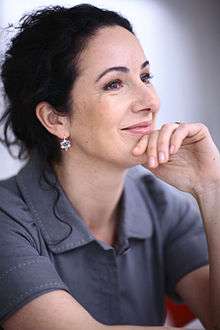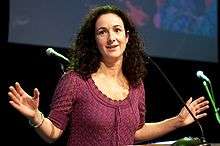Femke Halsema
| Femke Halsema | |
|---|---|
 Femke Halsema in 2010 | |
| Parliamentary leader - GreenLeft House of Representatives of the Netherlands | |
|
In office November 26, 2002 – December 16, 2010 | |
| Preceded by | Paul Rosenmöller |
| Succeeded by | Jolande Sap |
| Member of the House of Representatives | |
|
In office May 19, 1998 – January 12, 2011 | |
| Succeeded by | Rik Grashoff |
| Personal details | |
| Born |
25 April 1966 Haarlem, Netherlands |
| Political party | GreenLeft |
| Residence | Amsterdam |
| Website | www.femkehalsema.nl |
![]() Femke Halsema (born April 25, 1966) is a former Dutch politician. She was a member of the House of Representatives from 1998 till 2011. She was also the leader of the GreenLeft parliamentary party in the House of Representatives from 2002 till 2010.
Femke Halsema (born April 25, 1966) is a former Dutch politician. She was a member of the House of Representatives from 1998 till 2011. She was also the leader of the GreenLeft parliamentary party in the House of Representatives from 2002 till 2010.
Life
Pre-political career
Halsema was born in Haarlem, North Holland into a social-democratic family. Her mother - O.B.M. Fles - was a long-time alderwoman for the social-democratic PvdA party in Enschede. Halsema is likely of Jewish descent on her mother's side, and she has said she was bullied as a child because of her dark looks.[1]
In 1984 Halsema graduated from high school with a HAVO diploma. After that she took courses at the Vrije Hogeschool (teachers program for Waldorf schools) in Driebergen. In 1985 she started training as a teacher, specializing in History and Dutch in Utrecht. She quit the teacher training programme in 1988 without taking her degree, and commenced on a degree course in social sciences at the University of Utrecht. In 1992 she became a "supernumerary lecturer in scientific methods and techniques" at the faculty for social sciences. She took her degree in 1993, having specialized in criminology.
After 1993 Halsema's career began to develop. She was seen as a young political talent within the PvdA. She began to work for the Wiardi Beckman Stichting (WBS), the scientific institute linked to the PvdA. In 1995 she wrote the book "Ontspoord. Opstellen over criminaliteit & rechtshandhaving" ("Derailed, Essays about criminality and the law") which was published by the WBS. In 1996 she became a fellow of the German Marshall Fund, which involved a two-month trip to the United States. Since 1996 she was an editor of De Helling, a political magazine, linked to GroenLinks; in the same year she started combining her work at the WBS with a position at De Balie, a well-known Dutch political-cultural centre. As such she led the project Res Publica in 1997 which involved coordinating a conference about the role of the constitution in modern society. In 1997 she also joined the committee which wrote the PvdA programme for the 1998 elections. She also wrote "Land in zicht. een cultuurpolitieke benadering van de Ruimtelijke Ordening" ("Land in sight, a culture-political approach to spatial planning") together with Maarten Hajer, which was published by the WBS.
Even though she had been asked to stand as a candidate for the PvdA in the 1998 elections[2] she resigned from the PvdA in the autumn of 1997. The direct cause of her break with the party was the perceived police repression during protests during the 1997 European summit in Amsterdam.[2] At the same time, she had had misgivings about the course of the PvdA for a longer period of time. She considered the PvdA to have been unable to renew its social-democratic program and use the rising economic tide to invest in the public sector. After her break with the PvdA she had several smaller jobs: she wrote an editorial column in the newspaper Het Parool and in the IKON radio show De Andere Wereld ("The Other World"). She was also an editor of the series "Knowledge, Politics and Public Opinion" for the publisher Van Gennip.
Political career

In 1998 she became a GroenLinks candidate for the House of Representatives. As number three on the list she was the highest new candidate and practically guaranteed a seat in the House. In the elections, GroenLinks more than doubled its number of seats to eleven. During her first term in parliament, Halsema was spokesperson on justice. She received some attention when she criticized the new migration law proposed by Job Cohen.
In the 2002 elections, Halsema remained third on the party list, with the party losing one seat. During her second term in parliament, Halsema became vice-chairman of the GreenLeft parliamentary party. In July 2002 she became the party's spokesperson for the important first debate with the new Balkenende Cabinet. In November Paul Rosenmöller unexpectedly left politics. Halsema became the new political leader of GreenLeft. As party leader, Halsema took on a more prominent role in parliament. She has promoted several legislative initiatives: one of these initiatives made judicial review of laws possible, the second initiative, which she promoted with D66 leader Boris Dittrich, proposed a price fixation on books.
Halsema led the party in the 2003 elections, in which the party lost two seats. She remained the parliamentary party's chair and was also spokesperson for culture and media. Between October 2003 and January 2004, Halsema left the House of Representatives to give birth to twins. She was replaced temporarily by Marijke Vos.
After her return to parliament Halsema started an ideological discussion within the party. She claimed that GreenLeft was "the last left liberal party in the Netherlands"[3] breaking with the socialist roots of the party. She also started to call for closer cooperation between the three left-wing parties in parliament, the SP, the PvdA and GreenLeft. She asked PvdA-leader Wouter Bos to speak out in favour of a left-wing government after the elections in 2006. He refused to do so, not wanting to alienate the Christian-democrat CDA.
On 6 January 2006, she was surprisingly proclaimed "Liberal of the year" by JOVD, the youth organization of the conservative liberal VVD party, because of her new liberal course, and specifically her new view on the welfare state.[4]
On 3 July 2006 the nomination for the party leadership closed with Halsema as the only candidate, reaffirming her leading position in the 2006 Dutch general election. She chairs the GreenLeft parliamentary party during the current term of the House of Representatives.
On 17 December 2010 she announced her immediate departure from politics on Twitter. She left the House on January 11, 2011.
In 2013 she joined the Committee of Recommendation of Dutch whistleblower foundation Publeaks that on the 9th of September 2013 launched a whisteblowing Initiative based on GlobaLeaks software.[5]
Political views

Halsema sees herself as a left-liberal, in Dutch she prefers "vrijzinnig" (free-thinking) over "liberaal" (liberal) because the conservative liberal VVD is seen as the pre-eminent 'liberal' party. In 2004 she started a debate within her party about a new political course. Her new course emphasizes two concepts: freedom and pragmatism.
With the concept freedom Halsema seeks to connect herself with the "freedom-loving traditions of the left".[6] Like Isaiah Berlin, Halsema discerns two traditions of freedom: negative and positive liberty.[7] For Halsema negative liberty is the freedom of citizens from government interference. She wants to apply this concept especially to the multicultural society and rule of law, where she seeks to reduce the influence of government. Positive liberty is, according to Halsema, the emancipation of citizens from poverty. Halsema wants to apply this concept especially to the economy, the welfare state and the environment, where the government should take more action.
With pragmatism Halsema contrasts her politics with those of the new populist political right, such as Pim Fortuyn. While the right, in Halsema's eyes, has become dogmatic and tries to reform society on the basis of new principles, Halsema claims that the left has got more feeling for the "narrow margins of politics."[8] According to Halsema the left now emphasizes equitable outcomes, as opposed to merely fair-minded principles.
This new course has been integrated into several practical proposals on the economy, which together form "Vrijheid Eerlijk Delen" ("Sharing Liberty Fairly"). These proposals have led to considerable debate. Halsema proposes that the main goal of the welfare state should be the emancipation of citizens from poverty.[9] To ensure this she proposes a new model for the welfare state, which is modeled on the Danish welfare state. In her perception of the welfare state the government should endeavour to ensure full employment by cutting taxes on labour, increasing labour flexibility and creating more government jobs. If there is more work, so this theory goes, everybody can get a job, after a maximum of one year of unemployment. She also called for the implementation of a partial basic income.
Personal life
Femke Halsema lives in Amsterdam with her two children, twins Suzy and Bruno, and her partner, the documentary filmmaker Robert Oey.
References
- (Dutch) Parlement.com biography
- ↑ „Ik kan heel venijnig zijn”, Reformatorisch Dagblad, November 15, 2002 (interview)
- 1 2 "Femke Halsema deelt nu groene rozen uit" ("Halsema now hands out green roses") in Vrij Nederland of December 6, 1997
- ↑ “Halsema kiest voor liberalisme” ("Halsema chooses Liberalism") in NRC Handelsblad 11 October 2005
- ↑ Halsema Liberal of the year on JOVD site
- ↑ "Vanaf vandaag: anoniem lekken naar media via doorgeefluik Publeaks". volkskrant.nl. Retrieved 22 February 2014.
- ↑ a reference to the GroenLinks declaration of principles made by Halsema in Halsema, F. "Van Angstpolitiek naar Kanspolitiek" (6 September 2006) (in Dutch; "From the Politics of Fear to the Politics of Chance")
- ↑ Halsema, F., “Vrijzinnig Links” in De Helling 15:2 (2004) (in Dutch; "Free-thinking Left")
- ↑ a reference to a book written by PvdA prime minister Joop den Uyl in Halsema, F., “Vrijzinnig Links” in De Helling 15:2 (2004) (in Dutch; "Free-thinking Left")
- ↑ Halsema, F., Vrijheid Eerlijk Delen ("Sharing Liberty Fairly") can be obtained in Dutch
External links
| Wikimedia Commons has media related to Femke Halsema. |
- Linkse Lente, weblog of Femke Halsema and others (in Dutch)
- De Helling